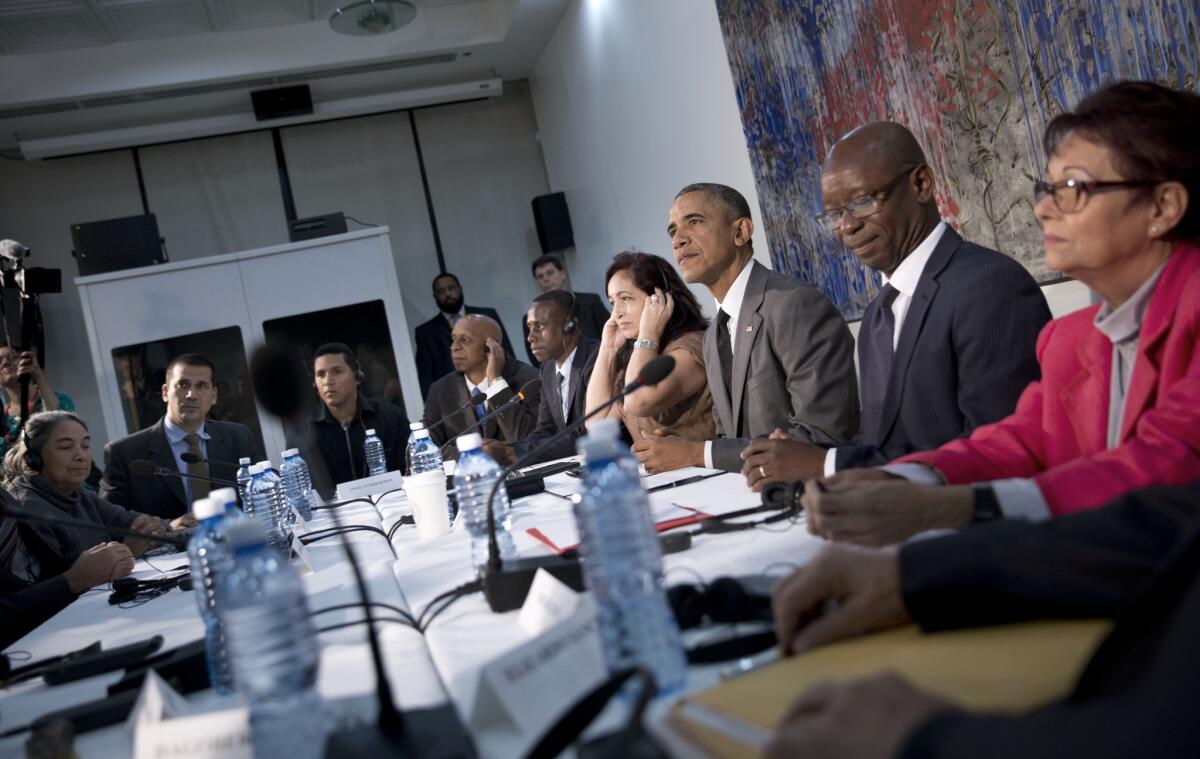What you need to know about the Cuban dissidents who met with Obama

President Obama meets with Cuban dissidents Tuesday at the U.S. Embassy in Havana.
President Obama sat down Tuesday with some of the most well-known members of Cuba’s small, beleaguered dissident community, including several who had been arrested just two days earlier.
Ladies in White
They included Berta Soler, head of the Ladies in White (“Damas de Blanco”) movement of wives or daughters of political prisoners. Miriam Leiva, another of the invitees, is a co-founder of the group but has since left it. The women march every Sunday from the Santa Rita Roman Catholic Church, dressed in white and with flowers in hand, to protest the Castro government. As has often happened, their march Sunday, hours ahead of Obama’s arrival in Havana, was broken up by Cuban security agents who hauled away about 50 members of the group, including Soler.
Antonio Rodiles
He was also arrested that day and, he says, roughed up by agents who broke one of his fingers. Rodiles is known for attempting to expand free speech through the arts and lecture series. He warned Obama on the day of his announcement of renewed ties, Dec. 17, 2014, that rapprochement would mean more repression for dissidents.
Guillermo “El Coco” Farinas
A journalist, one-time revolutionary and then political prisoner, Farinas has staged numerous hunger strikes to protest Cuban government policy, including one in 2010 that nearly killed him.
Elizardo Sanchez
He heads Cuba’s leading independent human rights organization and keeps meticulous records of arrests of activists. He told the Los Angeles Times over the weekend that many in the group had been ordered by Cuban security to stay home and miss the meeting with Obama, an instruction they all planned to defy.
In fact, transportation to the meeting Tuesday was provided by the U.S. Embassy in Cuba, Sanchez said in a telephone interview after talking with Obama for about an hour and 40 minutes.
Afro-Cuban activists
Laritza Diversent, a lawyer, and Manuel Cuesta Morua, who sat to Obama’s left in the meeting, are prominent Afro-Cuban activists. Obama had met both previously in Panama during the 2015 Summit of the Americas.
Nelson Alvarez Matute is an Afro-Cuban activist who works for both black and gay rights.
Miriam Celaya Gonzalez
Seated to Obama’s right, Celaya Gonzalez is an independent journalist and blogger whose sharply worded pieces are critical of both Cuban and U.S. governments. She once called strongman socialism a “virus” that doesn’t cure but kills.
Jose Daniel Ferrer
He heads an organization called the Patriotic Union of Cuba, a tiny group that also tracks arrests and protests government policies. He has provided assistance to dissident musical groups and rappers who use song to complain. In an interview with The Times last year, shortly after detente was announced, he predicted, rather presciently as it turned out, that Castro use the new arrangements to “gain the most while giving up the least.” Still, Ferrer supports Obama’s policy.
Dagoberto Valdes Hernandez
A prominent Catholic intellectual and writer.
Yunier Angel Remon
A rapper who spent time in prison after distributing antigovernment signs. In one slogan, he blasted government corruption, referring to the “rob-o-lution”.
Juana Mora Cedeno
An activist who works for LGBT rights.
Who was missing?
Noticeably absent from the conference table with Obama was the famous Cuban blogger Yoani Sanchez. She has tweeted that she is covering Obama’s visit as the journalist she is, not as a participant. Her friends have said she no longer wants to be seen as the face of the dissident movement but wants to work as an independent reporter. She did not respond to requests for comment.
Obama praised their courage, group members said. He also acknowledged that not all favored his policy of detente.
“What I explained to them is we will continue to speak out loudly on the things we care about. That’s not going to change. But isolation had in some ways empowered those who did not want to see change,” Obama later told ESPN while he attended a baseball game with Cuban President Raul Castro. “… We could not do what I did today, which was speak to the entire Cuban population to talk about the values that Americans care about.”
Twitter: @TracyKWilkinson
ALSO
Obama appeals directly to Castro on democracy but pledges to let Cubans direct their own destiny
Obama and Castro, side by side, both speak of human rights but sound discordant notes
Obama's going to a ballgame in Havana: Here's what he needs to know about Cuban baseball
Sign up for Essential California
The most important California stories and recommendations in your inbox every morning.
You may occasionally receive promotional content from the Los Angeles Times.







